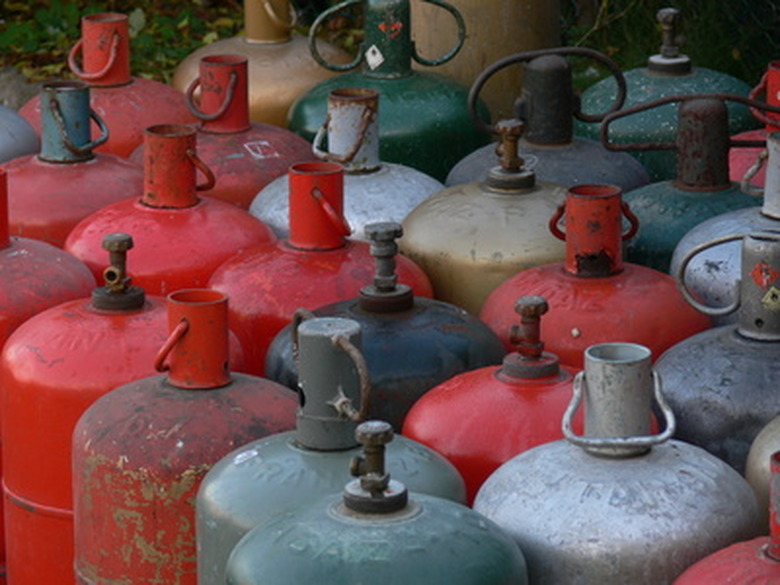What Is Butane Fuel?
If a lighter is used to start a grill or a liquid is poured on charcoal to ignite it more quickly, chances are it contains butane. Butane is a flammable, colorless gas at room temperature and standard atmospheric pressure. However, it is easily liquefied, and this makes it useful for lighters, especially cigarette lighters.
Chemical Formula and Isomer
Chemical Formula and Isomer
Butane refers to n-butane, or normal-butane, chemical formula C4H10, the unbranched, or single-chain, hydrocarbon. A hydrocarbon is a compound composed of hydrogen and carbon.
Isobutane, i-butane is an isomer of butane; it is also known as 2-methylpropane. It has the same chemical formula, C4H10, but the arrangement of atoms is not a long, single chain of carbons but is instead a branched carbon structure. This gives the compound some different properties from n-butane, such as boiling point.
Both the butane and isobutane are combustible fuels that burn in the presence of oxygen to form carbon dioxide and water vapor. When there is limited oxygen available, the combustion process may also produce carbon monoxide (CO).
Butane: Processing
Butane: Processing
Butane is derived from crude oil that was formed from the remains of plants and animals held under great pressure for millions of years. Crude oil contains a mixture of both long-chain and short-chain hydrocarbons, and branched and cyclic hydrocarbons.
Petroleum products are recovered by a process called fractional distillation. Crude oil is pumped into a furnace and heated at high temperature (over 600 degrees Fahrenheit, 316 degrees Celsius). Most hydrocarbon molecules evaporate and the gases are sent into a fractionating column.
Fractional distillation is the process in which a substance or mixture is separated into its fractions, or components. In the fractionating column, a structure that can rise 100 or more feet into the sky, the heavier molecules will condense at the lower levels, and the lighter hydrocarbons at the higher levels.
For example, asphalt condenses toward the bottom and gasoline and diesel fuel near the middle. Propane and butane condense at the top of the column.
Butane Uses
Butane Uses
Butane is used as a fuel primarily in cigarettes or other small butane lighters. At low pressure, it is a liquid. When the lighter is clicked open, pressure is released through a valve, the butane turns into a gas, and a spark ignites the gas into a flame. Butane canisters are often used as fuel for camping stoves, grills, BBQs, portable stoves, and other butane products (e.g. a butane torch).
Butane can be mixed with propane and commercially sold as LPG or liquefied petroleum gas. Commercially sold butane fuel in the United States is primarily propane (85 percent), but it has up to 2.5 percent butane. In other countries, the butane percentage can reach up to 50 percent. It can be used for heating and other appliances. Butane is added as a cost-effective supplement for propane gas.
Butane is also blended within the mixture of gasoline for automobile fuel. Other uses include the manufacture of organic chemicals, high-octane liquid fuels, propellants for aerosol sprays, refrigerants, and synthetic rubber and ethylene.
Effects of Butane on Health
Effects of Butane on Health
Butane is an extremely flammable substance and should be kept from exposure to heat and flame. The gas is heavier than air, and distant ignition is possible as it travels near the ground. The use of butane certainly does not come without health and environmental risks.
Liquid butane is capable of causing frostbite, and care must be taken to avoid skin and eyes. Skin contact may cause frostbite, symptoms of which include prickling, itching or numbness in the affected area. Severe frostbite causes blistering, discoloration of skin and severe tissue damage. Liquefied butane gas in contact with the eyes can lead to permanent eye damage.
The toxicity of butane is considered low, though inhalation may cause shortness of breath, dizziness, drowsiness, headaches and possible seizures. When butane gas is combusted, it may produce nitrogen dioxide, a highly toxic gas.
There are additional consequences from the emissions of butane. Butane qualifies as a natural gas, which is a type of fossil fuel. While natural gas fuel sources burn cleaner and more efficiently than coal and oil, they are still hydrocarbon gases meaning they contribute carbon and harmful pollution to the atmosphere. When we use butane it creates a long lasting impact on public health everywhere.
Cite This Article
MLA
Kozlowski, Rosann. "What Is Butane Fuel?" sciencing.com, https://www.sciencing.com/butane-fuel-6496032/. 21 June 2023.
APA
Kozlowski, Rosann. (2023, June 21). What Is Butane Fuel?. sciencing.com. Retrieved from https://www.sciencing.com/butane-fuel-6496032/
Chicago
Kozlowski, Rosann. What Is Butane Fuel? last modified June 21, 2023. https://www.sciencing.com/butane-fuel-6496032/
